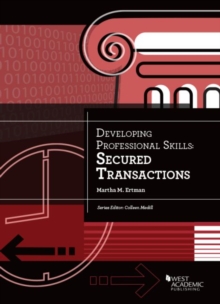
Developing Professional Skills : Wills, Trusts & Estates Paperback / softback
by Carla Spivack, Karen J. Sneddon
Part of the Developing Professional Skill series
Paperback / softback
Description
The Trusts & Estates book in the Developing Professional Skills series facilitates the incorporation of a wide range of practical legal skills into the trusts and estates classroom to promote student learning.
Each assignment draws upon key doctrinal concepts, such as donative freedom, intestacy, will execution and revocation, construction, trust creation & revocation, fiduciary duties, prenuptial agreements, will substitutes, charitable giving, and guardianship.
It also seeks to give students a footing in some of the more basic tasks an estate planning attorney would perform, such as explaining succession law to non-lawyers, planning to avoid will contests, locating intestate heirs, etc.
Students have the opportunity to develop and refine the following skills in the context of estate planning:Composing legal letters and professional emailsWriting court petitions, interrogatories, and charitable gift agreementsDeveloping counseling plans and best practices guidanceConducting a negotiationEngaging in client counselingCreating community presentationsSecondarily, this book also incorporates social issues that are inherent in the study and practice of estate planning.
These issues revolve around the role of estate planning and succession law in perpetuating wealth inequality. Many of the assignments touch upon these issues; it is of course up to the professor how much to draw them out and emphasize them.
Each assignment is complete and effective even without emphasis on these issues.
However, they add a worthwhile dimension to the book.
Information
-
Available to Order - This title is available to order, with delivery expected within 2 weeks
- Format:Paperback / softback
- Pages:64 pages
- Publisher:West Academic Publishing
- Publication Date:30/10/2022
- Category:
- ISBN:9781636594798
Information
-
Available to Order - This title is available to order, with delivery expected within 2 weeks
- Format:Paperback / softback
- Pages:64 pages
- Publisher:West Academic Publishing
- Publication Date:30/10/2022
- Category:
- ISBN:9781636594798










